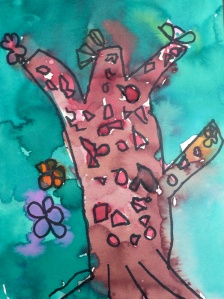Since if Mama’s not happy nobody’s happy, we begin our second week of a year of mindfully parenting with a focus on depression—in the hopes that if mama, or dada, isn’t feeling happy, we might get a little insight going, move the energy around and see if we can’t do a little something to help. Last week was all about fears and anxieties—which are about dread of the bad thing that we imagine is coming. Depression is largely about the feeling that nothing good is coming—the flip side of anxiety; the two are intimately related, connected and close friends. 
Firstly, depression can range from what we are better off to call normal human sadness, all the way to black despair and the potential for self-destruction. Depression also has a strong genetic component, and if your parents and/or grandparents suffered from it, you are at increased risk, as are your children.
If you, or someone you love, suffer from depression, it’s going to take a lot more than some ideas in a blog to move the needle. If you even remotely suspect that you, or someone you love, suffer from depression, please call your doctor, pastor, or local mental health clinic to find out if treatment is in order. This blog is meant to get ideas going, raise consciousness and inspire the reader to trust their own instincts—on parenting as well as on healing ourselves so that we can be better parents. Properly done, parenting in and of itself can be a powerful agent of change in our psyches. In fact, if we step up and parent even when we don’t feel like it we help change our minds by changing our behavior. Insight and compassion aim to support us to persevere and give, even when it pains us. This is productive suffering—it is not at all the same thing as denial.
A key thing to consider in depression is how it relates to anger. In boys and men, anger and oppositionality can be an indicator of depression; while true in girls and women, this pattern is less frequent. You tell such folks that they are depressed, however, and they deny it. They think that since they do not overtly feel sad, they are not depressed. Still, people who feel good about themselves are generally kind; therefore, angry outbursts and surly reticence suggest a mingling of depression and low self-esteem.
Although it is likely a reflection of internalized sexism, women tend to stuff their anger and turn it against themselves; sometimes depression is conceptualized as “anger turned inward.” So, if you are overtly angry, ask yourself, “What might I be sad about?” and if you are overtly sad, ask yourself, “At what, or whom, might I be angry?”
Often our resentment, sorrow and anger energistically cluster around our parents, and we find ourselves unable to forgive them for hurting us with their limitation or even with their overt cruelty. We may think we are punishing our parents by not forgiving, even if they are dead, yet the truth is that not forgiving hurts us and our children.
Our first step in improving thing is about better understanding our sadness and anger. If any readers are game to leave a comment about what sort of sorrow and/or anger you have not been able to let go of, perhaps it will guide our direction this week.
So.. what are you sad about?
And… what are you pissed about?
Namaste, Bruce


